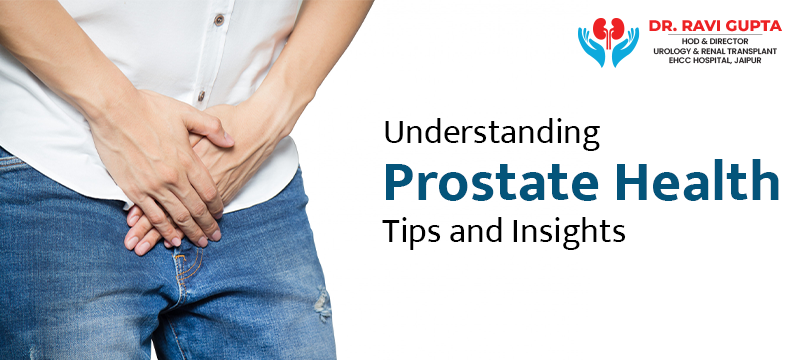
Understanding Prostate Health Tips and Insights from Dr. Ravi Gupta
Tips to manage symptoms, Causes & treatment options of prostate disease by Dr Ravi Gupta
Diseases related to the prostate are the most common among men. With over 1.4 million new cases diagnosed each year, understanding prostate health is more crucial than ever.
In this blog, Dr. Ravi Gupta describes tips for maintaining prostate health, its causes, and treatment options available to cure the disease. This article covers everything whether you’re looking to prevent issues or seek information on treatment options.
Understanding the Prostate Health
A prostate is a small gland in the size of a walnut. It is located just below the bladder and in front of the rectum. The prostate surrounds the urethra. The primary function of the prostate is to produce seminal fluid, which nourishes and transports sperm during ejaculation. As men age, the prostate can undergo various changes, some of which may lead to health issues. It’s better to consult a urologist if you are experiencing some symptoms of prostate disease.
Common Prostate Issues
Men can suffer from many prostate issues, here are some possible prostate diseases
1. Benign Prostatic Hyperplasia (BPH)
BPH is common in older men. It is a non-cancerous enlargement of the prostate gland. The symptoms of BPH are frequent urination, difficulty in stopping or starting urine flow, or a weak urine stream. BPH significantly impacts the quality of life.
2. Prostatitis
Prostatitis is a condition that is caused by inflammation in the prostate gland. Men can suffer from acute or chronic inflammation. Symptoms of acute prostate inflammation include pelvic pain, difficulty urinating, painful urination, and flu-like symptoms in acute cases. Chronic prostatitis can be more challenging and may require long-term management strategies.
3. Prostate Cancer
Prostate cancer is the most serious prostate disease. It often develops slowly and may not cause symptoms in its early stages. When symptoms do occur, they can include difficulty urinating, blood in the urine or semen, and pain in the lower back, hips, or thighs. You may consult a urologist if experiencing any of the above symptoms.
4. Prostate Infections
Many bacterial infections can affect the prostate and that can lead to acute or chronic prostatitis. These infections can cause severe pain, fever, and urinary symptoms, requiring prompt medical attention and antibiotic treatment.
Tips for Maintaining Prostate Health
Here are the tips to maintain your prostate health. Follow these tips for better prostate health.
● Do proper regular exercise or physical activity. It will help you to maintain a healthy weight and overall health. 30 Min daily exercise will help you prevent many diseases.
● A proper vitamin & protein-rich diet is essential for a healthy body. Include whole grains, lean protein, high antioxidant foods, and leafy greens in your diet to stay fit.
● Drinking plenty of water helps flush out toxins and maintain urinary health. Drink at least 8 glasses of water a day.
● Avoid alcohol and smoking as it can affect prostate health.
● Seek immediate medical advice, if suffering from any of the symptoms of prostate diseases.
Treatment Options
Multiple treatment options are available to cure prostate disease. Depending on the level of disease your medical doctor recommends the treatment. Here are the treatment options available for treating prostate diseases.
- Medication
Acute prostate diseases like BHP and Prostatitis can be easily treated with medication.
Some medicines can help relax the muscles around the prostate and reduce inflammation. Do consult a urologist before taking any medicines as maintaining prostate health is important, but not without doctor consultation.
- Minimally Invasive Procedures
Minimally invasive procedures like transurethral microwave thermotherapy (TUMT) and transurethral needle ablation (TUNA) are some options for treating moderate to severe BPH. These procedures use heat to shrink or remove part of the prostate tissue.
- Surgical Procedure
Transurethral resection of the prostate (TURP) and laser surgery are some surgical procedures to treat prostate disease. Through this surgery, defective tissue or tumors are removed from the prostate.
- Radiation therapy
Radiation therapy is used to kill the cancer cells. This procedure is recommended for people with prostate cancer. This therapy uses high-end energy rays that kill the cancer cells in the prostate. This can be done internally (brachytherapy) as well as externally
- Hormone Therapy
Prostate cancer often depends on testosterone to grow. Hormone therapy, also known as androgen deprivation therapy (ADT), reduces the levels of testosterone or blocks its effects, slowing the growth of cancer.
- Chemotherapy
People with advanced prostate cancer require chemotherapy treatment. At this stage, cancer spreads to other parts of the body. This therapy kills rapidly growing cancer cells in the body.
Conclusion
Prostate health is a critical aspect of men’s health that requires attention and proactive management. Understanding the prostate, recognizing common issues, and adopting healthy lifestyle habits can significantly impact your well-being. Regular screenings and staying informed about treatment options empower you to take control of your prostate health. Remember, early detection and timely intervention are key to managing and overcoming prostate-related issues for the best treatment book an appointment with Dr. Ravi Gupta.